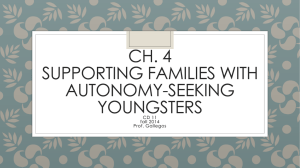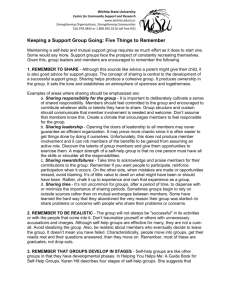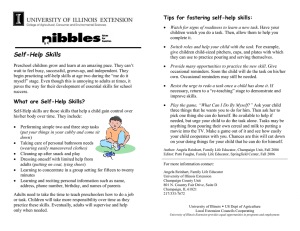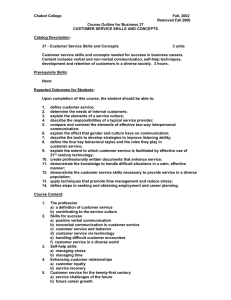Questionnaire of the Independent Expert on the enjoyment of all human rights by older persons on best practices in the implementation of...
advertisement
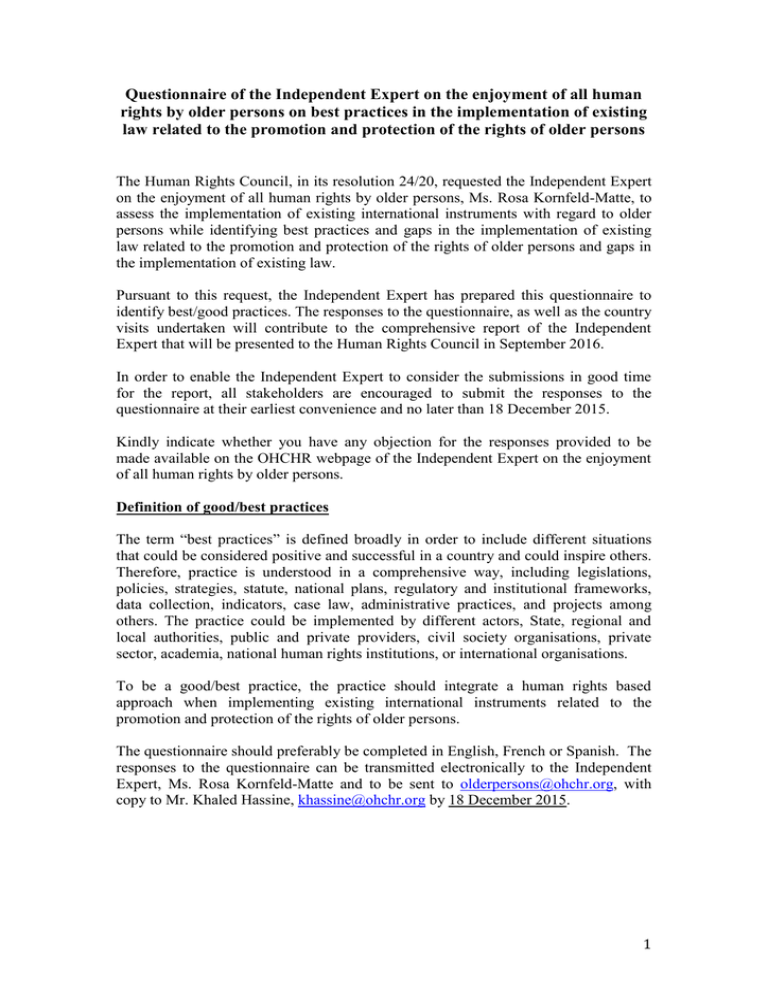
Questionnaire of the Independent Expert on the enjoyment of all human rights by older persons on best practices in the implementation of existing law related to the promotion and protection of the rights of older persons The Human Rights Council, in its resolution 24/20, requested the Independent Expert on the enjoyment of all human rights by older persons, Ms. Rosa Kornfeld-Matte, to assess the implementation of existing international instruments with regard to older persons while identifying best practices and gaps in the implementation of existing law related to the promotion and protection of the rights of older persons and gaps in the implementation of existing law. Pursuant to this request, the Independent Expert has prepared this questionnaire to identify best/good practices. The responses to the questionnaire, as well as the country visits undertaken will contribute to the comprehensive report of the Independent Expert that will be presented to the Human Rights Council in September 2016. In order to enable the Independent Expert to consider the submissions in good time for the report, all stakeholders are encouraged to submit the responses to the questionnaire at their earliest convenience and no later than 18 December 2015. Kindly indicate whether you have any objection for the responses provided to be made available on the OHCHR webpage of the Independent Expert on the enjoyment of all human rights by older persons. Definition of good/best practices The term “best practices” is defined broadly in order to include different situations that could be considered positive and successful in a country and could inspire others. Therefore, practice is understood in a comprehensive way, including legislations, policies, strategies, statute, national plans, regulatory and institutional frameworks, data collection, indicators, case law, administrative practices, and projects among others. The practice could be implemented by different actors, State, regional and local authorities, public and private providers, civil society organisations, private sector, academia, national human rights institutions, or international organisations. To be a good/best practice, the practice should integrate a human rights based approach when implementing existing international instruments related to the promotion and protection of the rights of older persons. The questionnaire should preferably be completed in English, French or Spanish. The responses to the questionnaire can be transmitted electronically to the Independent Expert, Ms. Rosa Kornfeld-Matte and to be sent to olderpersons@ohchr.org, with copy to Mr. Khaled Hassine, khassine@ohchr.org by 18 December 2015. 1 Please include in your submissions the name of the State/organization submitting the practice, as well as contact details. Feel free to attach additional pages if you have several good/best practices to share. Your contact details: Name: Natasa Todorovic State/ Organisation: Red Cross of Serbia Email: natasa@redcross.org.rs Telephone: +381112622121 Webpage: www.redcross.org.rs The Independent Expert would like to thank you for your support! For more information on the mandate of the Independent Expert, please visit: http://www.ohchr.org/EN/Issues/OlderPersons/IE/Pages/IEOlderPersons.aspx 2 Questionnaire of the Independent Expert on the enjoyment of all human rights by older persons on best practices in the implementation of existing law related to the promotion and protection of the rights of older persons 1. Name of the practice: Improving access to human rights of older people in the Republic of Serbia, is a project that the Red Cross of Serbia implemented in partnership with HelpAge International and financially supported by the European Union delegation in Serbia. 2. Area concerned: Discrimination (e.g. legal/institutional framework, access to facilities and services, etc.) Violence and abuse Adequate standard of living (e.g. resource availability, housing, etc.) Independence and autonomy (e.g. legal guardianship, accessibility, etc.) Participation Social protection (e.g. social security, incl. pension) Education, training and lifelong learning Care (home, family or institutional care, long-term care, palliative care, geriatric services, quality of care and availability of services, care workers, etc.) 3. Type of practice: Legal (Constitution, law, etc.) Policy/Programme/Strategy/Action Plan on Ageing Institution Regulation Administrative practice Case law/jurisprudence Disaggregated statistical data by age/gender Training programme Other (please specify): .................................... 4. Level of implementation: National Local (Sub-national, community, urban/rural area) Other (please specify): Age Demands Action campaign, done following the HelpAge International initiative from 2008. 3 5. Please describe the practice, including a) its purpose; b) when and how it was adopted; c) how long it has been used/implemented; and d) its geographic scope. Respecting human rights is a net benefit for the whole society because older people make key contributions to the society through their experience, knowledge and wisdom. Better protection and access to human rights of older people will enable the society to better sue older people’s potential. Also not to be forgotten is the fact that demographic ageing means that a larger percentage of voters are older people and that policy makers need to be aware of this when discussing access to human rights of older people. The project was comprised of several segments: Developing self-help groups and their regular activities and exchange of experience Educating older people on the topic human rights and how this translate in their everyday life Research on human rights: Legal framework for protection of human rights and the policy recommendations how to improve the status of older people Guidebook for human rights of older people in the Republic of Serbia Conferences and meetings Campaigns “Age Demands Action” Global activities The project envisioned developing 50 self-help groups in 25 municipalities with 500 active older persons as members. Thanks to the high level of motivation as well as recognizing the value of this model of work by some local governments, the project ended up having 54 groups and 572 older members. During the two years of the implementation of project, the self-help groups’ members have helped or assisted persons in their local communities to access their legally granted rights: Assistance with accessing human rights related to health protection was provided to 997 older persons through members of self-help groups Assistance with accessing human rights related to social protection was provided to 221 older persons through members of self-help groups Assistance with accessing the rights related to pension and disability insurance was provided to 87 older persons Advocacy Educations on human rights were another part of the project. These educations were designed as training of trainers: the older people, members of self-help groups who attended the training sessions were subsequently tasked with educating older people in their communities on the same topic, to encourage older people to recognize when their human rights are not accessible to access the institutions of the system and ensure free exercise of their rights. All 572 members of self-help groups were covered with this training and with another 89 young Red Cross of Serbia volunteers also attending the training sessions, the total number of directly educated persons is 661. These educated trainers then organized 96 local level education sessions and reached 1,992 older persons. Age Demands Action campaign, done following the HelpAge International initiative. These are global activities and they aim to have older people meet decision makers and have a dialogue develop so that older people can articulate the problems they encounter in their daily lives and suggest potential solutions to those in power. This campaign takes place in more than 60 countries (on 7 April, 15 June and 1 October). 4 Older people organised by the Red Cross of Serbia managed to visit three Serbian ministers (the Minister of Foreign Affairs Ivica Dačić twice and the Minister for Labour, Employment, Veterans and Social Affairs, Aleksandar Vulin once and the Minister for Youth and Sports Vanja Udovičić during the Third Age Olympic Games) as well as two Deputy Ministers (Ministry of Labour, Employment, Veterans and Social Affairs and Ministry of Health). 6. Which actors are involved in the development and implementation of such practice? For instance, national and local authorities; private and public sector; academia; civil society organizations; international or regional organizations; older persons themselves, among others. Directly involved: -Older people all over the Serbia. -Commissioner for Protection of Equality Indirectly we involved: -Team of the Government of Serbia for Social Inclusion and Poverty Reduction -Ministry of Labour, Employment, Veterans and Social Affairs -Ministry of Health, Ministry of Foreign Affairs -Ministry of Interior - Government Office for Human and Minority Rights, -Ombudsman -Institute of Public Health, -National Institute for Social protection -United Nations Population Fund (UNFPA) -World Health Organisation, -Belgrade office of the High Commissioner for Human Rights, UN -Team for Implementation of Antidiscrimination Policies in the republic of Serbia -Local authorities and local institution We also had international experts: Viviane Brunne (UNECE); Khaled Hassine from the Office of the High Commissioner for Human Rights, Geneva; Bridget Penhale, University of East Anglia, Richard Powley, Age UK and other experts from HelpAge International. 7. Which rights of older persons does the practice promote and protect? All Human Rights 8. How does the practice promote or protect such rights? Project was developed a number of policy recommendations aiming to improve both legislative framework but more importantly the implementation of the existing one when it comes to financial security of older people. Secondly, trough education of older people members of the self-help groups about human rights and the ways to protect their rights by using the exiting legal mechanisms (e.g. Ombudsman, Office of the Commissioner for protecting Equality, Protector of the Rights of Patients...). 5 Additionally important part was to encourage older people to claim their rights, because often their were skeptical regarding the outcomes of such efforts. 9. What groups of older persons (for instance, older women, persons with disabilities, persons of African descent, individuals belonging to indigenous peoples, persons belonging to national or ethnic, religious and linguistic minorities, rural persons, persons living on the streets, and refugees, among other groups), if any, particularly benefit from the practice? Assistance with accessing human rights related to health protection was provided to 997 older persons through members of self-help groups (assistance with validation of health insurance cards, assistance with gathering documentation needed to obtain a health insurance card, assistance with exemption from medical participation, assistance with procuring medication or utensils, assisting with reaching the Protector of Patients’ Rights…) Assistance with accessing human rights related to social protection was provided to 221 older persons through members of self-help groups (assistance to accessing the disability-related financial support, assistance with obtaining one-time financial support, assistance with accommodation in assisted living institutions…) Assistance with accessing the rights related to pension and disability insurance was provided to 87 older persons Advocacy was one of the crucial activities of self-help groups and here are some of the notable actions: petition for re-establishing a library, petition to erect a soundproofing railway fence, fixing the pavements, fixing the public drinking fountain, installation of a speed bump… The members of self-help groups, older persons made their requests to local governments in most cases but in some cases they addressed even the ministries 10. How has the practice been assessed and monitored? Please provide specific information on the impact of the practice, with data, indicators, among others, if any. The project was monitored by project staff both form Red Cross of Serbia and Help Age International and in next month the project evaluation will be carried out. In addition to this, all members of the self-help groups were completed the questioner about human rights and the perception of the access to their rights in Serbia. The results of this survey will be available in next two moths. 11. What lessons do you believe could be learnt from this practice? How could it be improved? The biggest problem that older people facing is insufficient knowledge about their own rights and entitlements. In the same time there is the issue of lack of information and access of information about their rights in the fast changing legislative landscape. All above mentioned contributing to the reluctance and skepticism from the side of older people in utilizing the existing legal mechanisms in claiming their rights. Organised programme of informing older people on their human rights 6 Support to self-organisation of older people (increasing the level of selfesteem and assertiveness, decreasing self-neglect and self-immolation) National campaign to suppress stereotypes and prejudice against older people as well as to build positive image of older people, increase public awareness on their capacities, needs and rights and promote them as active members of the society New National Strategy on Ageing with an action plan must be created and adopted Establish an efficient system of free legal help to ensure that every socially vulnerable older person can be assisted free of charge in exercising hers or his personal, property and other rights in court or in communication with other public institutions Improve legislation related to processes of legal inheritance so that older people participating in process can get all necessary information and clarifications, following the principles of open justice. Full deprivation of one’s legal capacity is unacceptable from the human rights point of view – partial deprivation in certain areas may be acceptable Programme of prevention of economic abuse, especially of women Providing appropriate financial support to families providing care to dependent older members Establishing shelters for older homeless persons and expansion of foster services Education of professionals and older people 12. How could this practice be a model for other countries? Self-help groups are highly sustainable because they do not require considerable financial resources and they are pretty adaptable model in the way that they be organised in very different contexts. Their main feature was flexibility that allowed each of the groups to have its own dynamic and decide what their goals are, in harmony with the local community’s needs. These groups are a good model for activism and social inclusion of older people because they allow them to expand their social contacts and become active members of their communities. The groups also support solidarity because their members assist and support each other and some of them work on intergenerational solidarity by investing efforts in improving the status of younger persons in their local communities. In some of the municipalities, these self-help groups acted as advocacy groups working on behalf of everyone in the community. The conclusion is that older people need to know that their rights are protected and accessible in practice: the right to safety and minimal guaranteed income, the right to manage own property, the right to information and access to judicial system, the right to work, the lifelong learning and health… All these rights are granted by law and other conventions but are often out of their reach in practice. To conclude on a positive note by quoting one of the older self-help groups members: “I can get old but I cannot become outdated”. We have a lot of work ahead of us if we are to ensure improved status for older people in Serbia, especially in informing them and 7 motivating them to be active because this is the only way to achieve full equality and access to human rights for everyone *** 8
